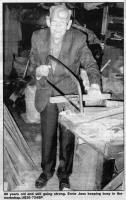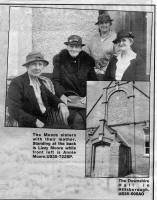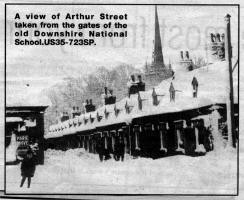
DOWNSHIRE SCHOOL
 |
 |
| Ernie takes a trip down memory lane to Downshire National School | The Moore sisters with their mother. Standing at the back is Lizzy Moore while front left is Annie Moore.US35-7225P. |
THE news that the former Downshire school in Hillsborough has been sold to developers has revived memories for a former pupil of the school which existed from the site at the turn of the last century.
Carpenter and joiner Ernie Jess celebrated his 90th birthday earlier this year but still has clear memories of attending Downshire National School.
He believes it was. back in 1914 when he was aged about two that he first left his home in Hillsborough's. Arthur Street and walked the 150 - yards or so to Ballynahinch Street to begin his schooling.
"My earliest memories of the school include one Miss Alice Bradshaw who was monitor at the time," he said.
"Monitors weren't qualified teachers, they were the equivalent of modern day classroom assistants, who had to spend at least a year as a monitor before being given a clean bill of health as it were to train as a teacher in Dublin.
"There were around 150 pupils and five teachers in all at the school at the time I remember - the Master, Mr William Arthur Kirkwood who was a Maralin man, three ladies teachers who included the Moore sisters, Lizzy and Annie, and the monitor.
"Miss Bradshaw was in charge of the youngest children while Annie Moore took the older boys and girls and the Master taught the top classes."
Form classes were known as 'standards' in Ernie's time and carefree schooldays ended after the sixth , things like spelling, grammar and standard Punctuation when pupils were just 14.
"Children started school very early in those days, some were only 18 months old when they came to school and would be there in their petticoats," said Ernie.
Times
"There were even times when some of the more 'active' youngsters would be tied with a ribbon to the leg of the teacher's desk or chair, in order to stop them from crawling out of the room!"
Ernie said the Master was a 'highly regarded' individual, an upright and gracious member of society who like the local doctor and rector was very well respected by all who knew him.
"William Afthur as we called him amongst ourselves was a strict man but fair, and while he didn't spare the rod, there was no question of him being brutal or excessively cruel with his punishments. That was just the way things were at the time, there was a cane in the classroom and if you misbehaved in any way or didn't do your work properly it was used.
"The Master was very keen on instructing pupils in the three 'R's - reading, writing and arithmetic and most of the learning was done by rote.
"You had to memorise your times tables, spellings and history dates. There was great emphasis placed on things like spelling, grammar and punctuation.
In Geography for example you had to know all the capes and bays in Ireland, be able to recite all the counties, what the main towns were in them and the principal products they were known to manufacture. It was learning by repetition really, not like it is nowadays.
We used to sit at big long desks that , would accommodate about six or seven children, and which had inkwells in them.
The school was quite advanced for its time really, with flush toilets in the school yard."
Ernie remembers Mr Kirkwood as a cultured gentleman who loved music and Shakespeare.
"The Master used to give us music and singing lessons. He would draw up the musical score on the blackboard and we would sing along to it, and there were occasions when he would arrange trips to the Belfast Opera House where you could see Shakespeare plays being performed," said Ernie.
"We also used to have to learn famous quotations and extracts from Shakespeare by heart."
Children didn't have to wear uniform to school, they just went in whatever attire their parents could afford. Most were reasonably dressed however, the boys wore short trousers throughout and all children were properly shod, usually wearing heavy wood and steel soled shoes called clogs, in the winter months.
Another
The summer was another matter altogether.
"During the six week summer holiday we used to run about barefoot wearing a woollen jersey and corduroy trousers," said Ernie.
The school itself was maintained and run by the wealthy and altruistic Hill family of Downshire.

The god fearing Hills were responsible for the building of the village church and the school.
"There was great emphasis placed on religious education, the rector would visit regularly and the sexton used to do all the maintenance work, he would light the fires in the school and the like," said Ernie.
"The Hill family took responsibility for the upkeep and heating of the school and I remember clearly the 20ft spruce tree that was cut down and brought for display at the school at Christmas time," said Ernie
"There was a wise choice of gift like a book for every child placed in the branches of the tree.
"Lord Arthur Hill also used to hand us out prizes during the school sports day which used to beheld in the quadrangle of the Old Castle.
"He would stand at the entrance with large laundry baskets filled with half pound bags of sweets, shake your hand and give you a bag of sweets regardless of whether you had won a prize for sports or not."
Sometimes there were football matches played at Drumbeg Park or nature rambles in the Great Park, which was the grounds of the big government house in Hillsborough. Ernie also can also recall two of the school's most famous past pupils. "Professor Frank Pantridge, who invented the cardiac defibrillator went to the same school for a few - years and so did Sir Hamilton Harty, who went on to become a famous musician, composer and arranger of music," he said. "I knew them both to see."
It was a sad day for Ernie when he had to leave school after the sixth standard.
"I could have carried on rightly, I loved being at school, but in those days you didn't continue with your studies unless you came from a wealthy family or even one where the family could do without the extra wage that a teenager would bring in, he said.
Ernie went on to live a full and interesting life after bidding farewell to Downshire National.
He worked for some years as a farm hand for G.&H. Bell, before -moving on to the Ministry of Agriculture's Forestry Division.
From there he took up a position as a boy porter with the Great Northern Railways before becoming a bus conductor in the Great Northern Railway-owned buses.
He then served in the Second World War in the Royal Artillery.
After he was de-mobbed in 1946 Ernie trained as. a carpenter and joiner under a rehabilitation scheme, and when he retired 25 years ago he was working for UK Optical Company in Lurgan.
In 1935 Ernie married Sarah Irwin and the couple had three sons. Sarah died 20 years ago and Ernie. now a grandfather of seven, still lives in the family home in Dollingstown.
If Ernie's story has prompted some memories of Downshire National School for you or someone you know, then give Susan a ring at the Star on 9267 9111 and let us in on your recollections.
